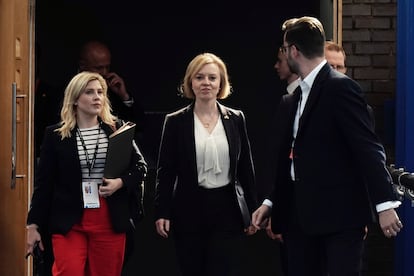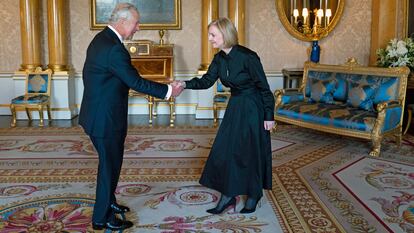The long journey to neoconservatism of British PM Liz Truss
Once anti-royalist, anti-Thatcher and anti-Brexit, the Tory leader made a radical political shift to become the heroine of Conservative Party hardliners. But what will her new U-turn on tax cuts do for her image?

The moment of truth has arrived for Britain’s new prime minister, the chameleon-like Liz Truss. The turbulence experienced by the British pound following the announcement of a tax cut for top earners, and the U-turn announced by her government on Monday, will reveal whether Truss’s ideological journey towards neoconservatism was just another makeover, or a definitive path from which she will not be swayed.
Truss’s ability to adapt has allowed her to survive three Conservative prime ministers, during which time she occupied six ministerial posts. It has also allowed her to build an image of herself as a champion of Brexit – which she was initially against – and of Margaret Thatcher’s neoliberalism – which she was not a fan of in her youth – enabling her to seduce the most militant members of the Conservative Party. Barely 81,000 Tories voted this politician into Downing Street, then watched her launch the most radical tax cut of the last half century in a risky gamble to retain power.
But Truss was unable to resist the pressure of her colleagues in the Conservative Party, who were watching all their electoral expectations going down the drain after the announcement of the unpopular tax cut. On Monday, Kwasi Kwarteng, the chancellor of the Exchequer, was charged with the humiliating task of announcing that he was backtracking on the most detested measure of all those he had announced just a week ago: the abolition of the top income tax rate of 45% on high earners (taxpayers earning more than €170,000 a year).
Dominic Cummings, the brilliant strategist who designed the campaign to leave the EU prior to the 2016 referendum – and subsequently worked as advisor to former PM Boris Johnson during the latter’s first year in office only to become his sworn enemy – recently gave his opinion of Truss to the digital magazine UnHerd: “She’s about as close to properly crackers as anybody I’ve met in Parliament.”
Cummings chose the offensive term “crackers” to denigrate someone who was not his favorite to replace Johnson. Of course, such excessive language has become part and parcel of politics, a world in which the struggle for power is invariably imbued with personal overtones. Others, such as former Conservative MP Anna Soubry, a pro-Europe politician who has now left the party and who worked alongside Truss in various ministries, also had few flattering things to say about the UK’s new PM: “She is one of the most ambitious people I have ever met. I sincerely believe that many of the posts she was given during her upward trajectory in the government were to keep her quiet. Her ambition is certainly considerably greater than her ability.”

And yet many Conservatives have clung to the images of Truss that reflect the best of themselves. First, that of the minister who remained loyal to Boris Johnson when everyone else was stabbing him in the back. Second, and perhaps more relevant, that of the politician who defended with all the zeal of a convert the neoliberal creed with which the hardline Brexiteers pushed their Brexit project through – a project to which they have clung during the years of the nebulous ideology of the Johnson era with its low taxes, market deregulation, patriotism and nationalism. “In these difficult times, our country needs a steady hand and a cool head in Downing Street,” wrote former party leader Iain Duncan Smith about Truss. “Her blend of firmness, experience, determination and pragmatism are exactly what we need for the tough days ahead.”
Firmness, determination, pragmatism. It is possible to have all these qualities in order to adapt to the moment without losing sight of the ultimate goal of reaching power. A look back at statements made by the 47-year-old politicians throughout her career helps understand what makes the new Prime Minister tick.
The contradictions
Brexit
In 2016, the United Kingdom was divided before the referendum of a generation: Brexit. David Cameron’s Conservative government was desperately struggling to avoid a break with Brussels. At the time, Truss was Minister of the Environment, Food and Rural Affairs, and she was a fervent Remainer.
“I am backing Remain as I believe it is in Britain’s economic interest and means we can focus on vital economic and social reform at home,” Truss said at the time.
In July 2022. Truss launched the manifesto with which she intended to win the Conservative leadership. “EU regulations hinder our businesses and this has to change... In Downing Street, I will seize the chance to diverge from outdated EU law and frameworks and capitalise on the opportunities we have ahead of us.”
Margaret Thatcher
In the 1980s, there was especially intense rejection of Thatcher’s policies and of the Iron Lady herself among the Scottish left. Truss’s father was a math professor at the University of Leeds and her mother was a nurse with close ties to the nuclear disarmament movement. “Maggie, Maggie, Maggie, Maggie, out, out, out, out,” shouted the protesters. Little Liz was one of them, and she has since told the story of how enthusiastically she and her mother made a nuclear mushroom out of the remains of old carpets to take to one of the protests in Paisley.
Fast-forward to London, August 2022. The favorite candidate to lead the Conservative Party is wearing the same type of blouses that Thatcher used to wear for her televised debates. She even photographed herself aboard a military tank, months earlier, in Estonia, in a replica of the famous photo of the Iron Lady during her 1986 visit to British troops stationed in West Germany. Truss rejects any comparison between the two, but, in practice, conveys the same message of radical change: “We need to be bold. We need to do things differently. We need to cut taxes. We need to unleash growth. We need to unleash the potential of all of the people across our great country,” she declared in a 2022 post on her official Twitter account.
The monarchy
In 1994, a youthful Truss spoke at the Liberal Democrat Party congress in Brighton. She was 19 and a furious anti-monarchist who surprised the party faithful with her vehemence. “I’m against the idea that people can be born to rule. That people, because of the family they’re born into, should be able to be the head of state of our country: I think that’s disgraceful.”
On September 8, 2022, just 48 hours into her new role as prime minister, Truss emerged outside Downing Street wearing black to announce the death of Queen Elizabeth II.
“Today the crown passes as it has done for more than 1,000 years to our new monarch, our new head of state, His Majesty King Charles III,” she said, adding: “We must come together as a people to support him, to help him bear the awesome responsibility that he now carries for us all.”
U-turn on tax cuts
The roller coaster ride of Truss’ first weeks in Downing Street has been a humbling experience for a politician who was exhibiting the fanaticism of a convert. Until the very last minute, the prime minister had been insisting that the UK needed shock therapy to break out of its decade-long lethargy, and that she would not backtrack on her plans. Truss and Kwarteng were reviving the outdated doctrine of the Reagan and Thatcher era, according to which lower taxes, less public spending and less state intervention would generate growth and trickle down through the economy. But the idea of returning to an era of austerity and passing these kinds of measures triggered a reaction from conservatives themselves.
“We get it, and we have listened,” wrote Kwarteng on Twitter on Monday, just hours ahead of an annual party conference in Birmingham.
For the time being, the markets seem to have heeded the correction: the pound gained back ground against the dollar after a dizzying week of losses. But the Truss government is maintaining many of its other tax plans, some of which are just as unpopular as the abolished rate on high earners, such as ending the existing cap on variable performance bonuses for senior executives in the City, the financial heart of London. And then there are the direct subsidies to households and businesses to help them with mounting gas and electricity bills, amounting to more than €150 billion. Truss has begun to patch up the political hole caused by her government’s first measures, but she has yet to convince the markets that she can also patch the economic hole. On October 14, the Bank of England will cease buying government bonds. It will be then that the credibility of the new executive will be put to the test.
Tu suscripción se está usando en otro dispositivo
¿Quieres añadir otro usuario a tu suscripción?
Si continúas leyendo en este dispositivo, no se podrá leer en el otro.
FlechaTu suscripción se está usando en otro dispositivo y solo puedes acceder a EL PAÍS desde un dispositivo a la vez.
Si quieres compartir tu cuenta, cambia tu suscripción a la modalidad Premium, así podrás añadir otro usuario. Cada uno accederá con su propia cuenta de email, lo que os permitirá personalizar vuestra experiencia en EL PAÍS.
¿Tienes una suscripción de empresa? Accede aquí para contratar más cuentas.
En el caso de no saber quién está usando tu cuenta, te recomendamos cambiar tu contraseña aquí.
Si decides continuar compartiendo tu cuenta, este mensaje se mostrará en tu dispositivo y en el de la otra persona que está usando tu cuenta de forma indefinida, afectando a tu experiencia de lectura. Puedes consultar aquí los términos y condiciones de la suscripción digital.









































